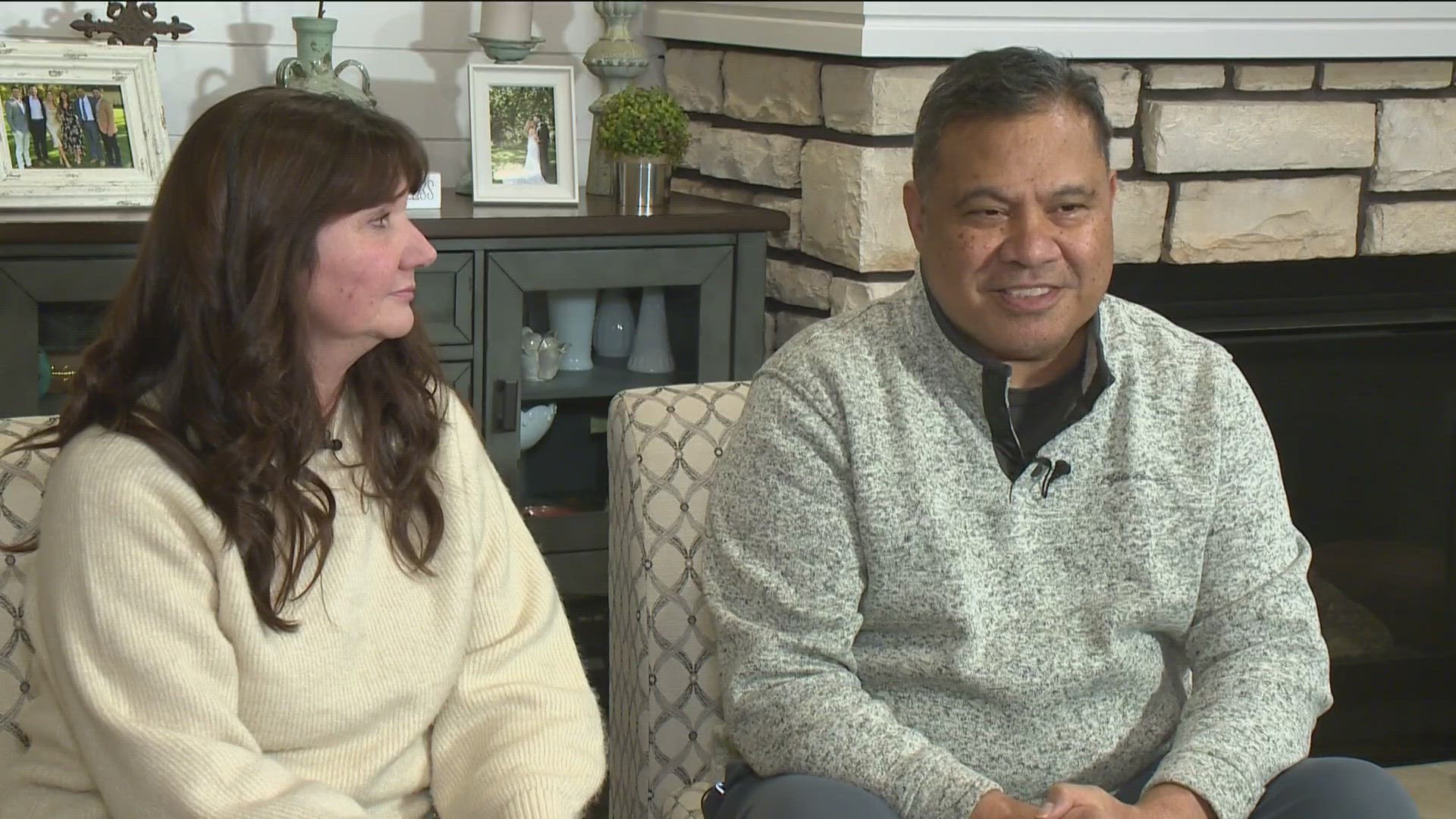MERIDIAN, Idaho — A loving husband, father, mentor and beloved local football coach is now a kidney disease fighter.
Considered the "silent disease", Ron Manu didn't catch his kidney failure until it grew too hard to ignore last April.
"It's a silent thing until all the sudden it's too late," his wife, Michelle Manu, said.
Right before a family trip to Mexico, Ron felt tired and started throwing up.
"I thought it was the flu," he said. "And then when I finally took my blood and urine tests that's when it showed its ugly head."
He said those tests found high levels of phosphates and creatinine and low levels of vitamin D and calcium.
Although he was urinating and releasing fluids, his kidneys weren't filtering out toxins and waste. Still, he tried pushing through.
"He didn't want to share, he doesn't like to tell a lot of people," Michelle said.
"That's been my personality all my life though," Ron added, "That's what brought me to Idaho was being an athlete playing football at Idaho State and that's the way I approached this disease was ok this is just another hurdle I have to jump. I'll be fine."
Ron wasn't fine.
He wound up in the emergency room at St. Luke's where doctors diagnosed him with stage four chronic kidney disease. He was specifically diagnosed with end stage renal disease, according to his doctor.
"It was very scary. knowing him and his personality he's the strong one and he's fine. a lot of symptoms you could explain away like oh he's tired," Michelle said.
A year after being diagnosed, Ron is finally bringing attention to his chronic kidney disease in hopes of helping others during the month of March, which is National Kidney Month.
Ron is among 37 million Americans -- about 15% of adults in the U.S. -- living with the disease.
"The human body has a remarkable ability to adapt to declining kidney function so patients may have no to minor symptoms up until point where kidneys are completely failing," said Dr. Jerry Meng, Ron's nephrologist.
"If it's too late in the game, that's when a lot of people find out they have CKD and by then, you need a replacement. I was just being so bullheaded; I was like, 'Oh, I'll get through this, I will beat this,'" Ron said.
The hardest part, he said, was telling his three boys his kidneys were shutting down.
"Putting myself out there and showing them weakness like that, it's tough," Ron said. "But at the same time after getting disease, I use this as a lesson for them so they need to look out for this, too."
Ron has diabetes and high blood pressure -- two health conditions that run in his Pacific Islander family, and the two leading causes of kidney disease.
"There are certain ethnic groups that do have higher risks of progression of kidney disease and needing dialysis," Dr. Meng told KTVB.
While he was in the hospital in April, Ron met Dr. Meng, who put him on hemodialysis.
Because the 57-year-old lives an active lifestyle and works full time, his kidney team transferred him to peritoneal dialysis, which he can do from home every night while he sleeps until he, hopefully, gets a new kidney.
"I think Ron is doing really, really well for a dialysis patient," Meng said.
Through his battle, Ron and Dr. Meng encourage others who are at risk to eat clean, stay active and test early.
"If you have history of high blood pressure, diabetes, family history of kidney disease, if you have history of autoimmune disease, history of kidney stones or urological issues – it may behoove that person to speak to primary care provider to perhaps get some routine screening of blood and urine for kidney disease," Dr. Meng said.
Meng said early detection could help prevent or slow chronic kidney disease.
"The message I’d like to deliver is a message of hope. there are some things we can do to prevent, treat kidney disease that we have more of now in the last 5-10 years than did in the past. there have been more genetic testing options including wider utilization of gen testing than in the past to detect at risk populations for kidney disease," Meng said.
That message of hope is one that he wants to spread too, as Ron waits for the perfect match. the Manu family said faith and family are helping them get through this.
"Only the Lord will pick the right kidney for me," Ron said.
Ron signed up to get a new kidney about three months ago. He's one of more than 100,000 people in the U.S. waiting for kidney transplants. About 17,000 people get one every year. People can wait years to get a kidney.
Dr. Meng says there are many reasons it can take that long. He said it can be difficult to find good matches because blood and other medical and compatibility issues limit the supply of organs. Different regions handle transplants differently. Overall, our system for organ donation and procurement needs improvement.
Most of us have two kidneys. However, we only need one healthy one.
So Meng and the Manu family encourage people who have friends or family members on dialysis and feel compelled to help to contact that individual and their specific transplant center to look into donating a kidney.
If you want to learn more about Ron's story and how you can help, visit his profile on the National Kidney Registry.
Watch more Local News:
See the latest news from around the Treasure Valley and the Gem State in our YouTube playlist:

